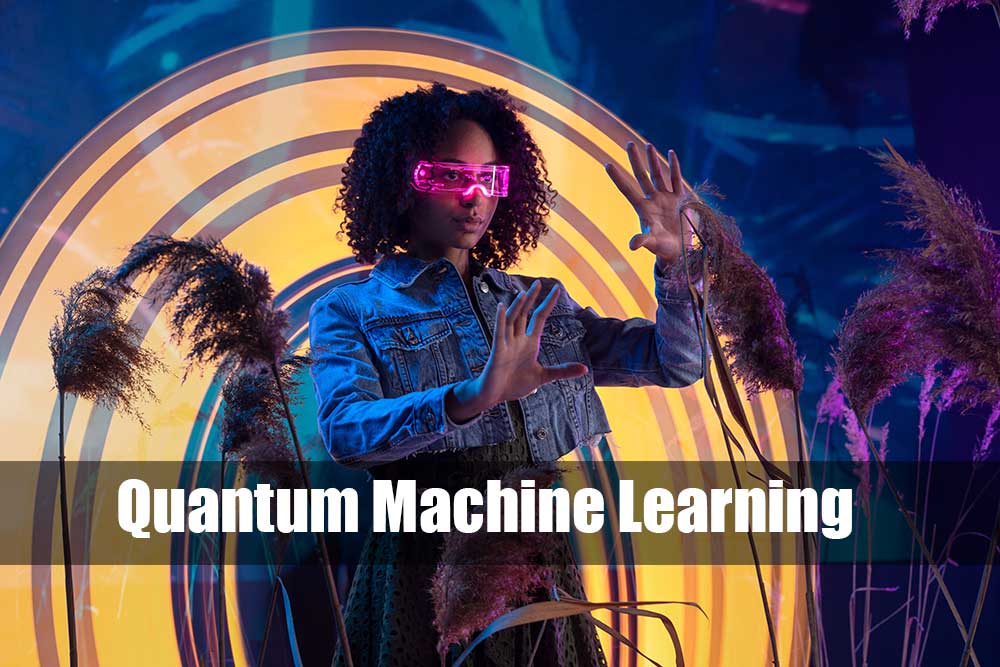Quantum Machine Learning (QML) is an emerging interdisciplinary field that blends the principles of quantum computing with the algorithms of machine learning (ML). It holds great promise in revolutionizing various industries, such as healthcare, finance, artificial intelligence (AI), and scientific research. In this comprehensive guide, we will explore Quantum Machine Learning in-depth, providing a clear and structured overview of its principles, applications, algorithms, challenges, and potential. This article is aimed at students, researchers, and educators who wish to understand the basics and advanced concepts of QML.
Introduction to Quantum Machine Learning (QML)
Machine learning is a subfield of artificial intelligence that focuses on creating algorithms that enable computers to learn from and make predictions based on data. Traditional machine learning techniques, however, have limitations when dealing with complex, high-dimensional data. Quantum computing, on the other hand, leverages quantum mechanics to perform calculations at speeds and efficiencies far surpassing classical computers.
Quantum Machine Learning seeks to integrate quantum computing with machine learning to overcome these limitations. By using quantum bits (qubits) instead of classical bits, quantum computers can process vast amounts of data in parallel, potentially solving problems that would take classical machines much longer to address.
Understanding Quantum Computing Basics
Before delving into Quantum Machine Learning, it’s essential to understand the basics of quantum computing. Quantum computers are radically different from classical computers, using principles from quantum mechanics.
1. Qubits:
Classical computers use bits to represent data, which can be either 0 or 1. In contrast, quantum computers use qubits. A qubit can exist in a state of 0, 1, or any superposition of both states simultaneously, thanks to the principle of superposition. This allows quantum computers to explore many possible solutions at once, greatly speeding up computations.
2. Entanglement:
One of the most remarkable aspects of quantum computing is quantum entanglement. When two qubits become entangled, the state of one qubit directly affects the state of the other, regardless of the distance between them. This phenomenon allows quantum computers to perform highly parallel computations, enabling them to solve complex problems more efficiently than classical systems.
3. Quantum Gates:
Quantum gates manipulate qubits in various ways. These gates form the building blocks of quantum circuits, analogous to classical logic gates in conventional computers. Quantum gates can create superpositions, entangle qubits, and perform operations that classical gates cannot replicate.
4. Quantum Speedup:
Quantum speedup refers to the potential for quantum algorithms to solve certain problems exponentially faster than classical algorithms. This is achieved by harnessing quantum superposition and entanglement to explore a vast solution space more efficiently.
What is Quantum Machine Learning?
Quantum Machine Learning (QML) applies quantum computing principles to traditional machine learning models. By leveraging quantum parallelism and the unique properties of qubits, QML has the potential to accelerate learning algorithms, leading to faster processing of complex data and more accurate predictions.
In QML, quantum computers can be used to enhance various aspects of machine learning, including:
- Data Representation: Qubits can represent data more efficiently by utilizing quantum states like superposition, allowing them to encode more information than classical bits.
- Model Training: Quantum computing can speed up the training of machine learning models by solving optimization problems more efficiently, reducing the time and computational resources required.
- Pattern Recognition: Quantum machine learning can improve the accuracy of models by uncovering hidden patterns in high-dimensional data, which classical algorithms may struggle to find.
Key Components of Quantum Machine Learning
- Quantum Data Encoding: One of the primary challenges in quantum machine learning is how to encode classical data into a quantum system. Quantum computers operate on quantum data, but real-world data is classical. Quantum machine learning relies on algorithms that encode classical data into quantum states so that quantum computers can process it. Some popular methods for encoding data into quantum states include the quantum amplitude encoding and quantum feature encoding methods.
- Quantum Algorithms for Machine Learning: Several quantum algorithms have been developed to solve machine learning problems more efficiently. These include:
- Quantum Support Vector Machines (QSVM): A quantum version of the classical support vector machine algorithm, which can find optimal hyperplanes for classification tasks.
- Quantum Principal Component Analysis (QPCA): This algorithm is used for dimensionality reduction and data compression by finding the most important features in a dataset.
- Quantum k-Means Clustering: A quantum approach to the classical k-means clustering algorithm, which can potentially speed up the clustering process for large datasets.
- Quantum Neural Networks (QNN): Quantum neural networks are quantum analogs of classical artificial neural networks. They combine quantum mechanics with deep learning techniques, such as backpropagation, to train quantum circuits. This combination can potentially lead to more powerful models capable of solving complex problems faster.
- Quantum Circuit Learning: Quantum circuit learning is a framework in which machine learning models are implemented on quantum computers. These circuits use quantum gates to transform input data and produce outputs. Quantum circuit learning can outperform classical methods in certain cases, particularly in tasks such as optimization and simulation.
Applications of Quantum Machine Learning
Quantum machine learning has vast potential across several industries. Some of the most promising applications include:
1. Drug Discovery and Healthcare:
Quantum machine learning can be used to simulate molecular interactions at a quantum level, leading to faster and more efficient drug discovery. By analyzing large datasets of molecular structures, quantum algorithms can identify potential drug candidates more efficiently than classical algorithms.
2. Financial Modeling and Risk Analysis:
In finance, quantum machine learning can be applied to optimize portfolio management, risk analysis, and options pricing. Quantum computers can process large financial datasets at much higher speeds than classical computers, leading to more accurate predictions and risk assessments.
3. Optimization Problems:
Many optimization problems, such as those in logistics, supply chain management, and energy distribution, can benefit from quantum machine learning. Quantum algorithms can solve large, complex optimization problems faster than classical methods, leading to cost reductions and more efficient solutions.
4. Artificial Intelligence:
In AI, quantum machine learning can help improve pattern recognition, natural language processing (NLP), and decision-making algorithms. Quantum algorithms can accelerate training times for AI models, enabling them to process large datasets in shorter periods.
5. Image and Speech Recognition:
Quantum machine learning can also enhance image and speech recognition models by speeding up feature extraction and classification. Quantum algorithms can analyze high-dimensional data more efficiently, improving the accuracy and speed of these recognition tasks.
Challenges in Quantum Machine Learning
While quantum machine learning holds great potential, several challenges must be overcome before it can reach its full potential. These challenges include:
1. Quantum Hardware Limitations:
Quantum computers are still in the early stages of development, with hardware limitations such as qubit coherence time, noise, and error rates. These limitations prevent quantum computers from performing large-scale, reliable computations.
2. Data Encoding Issues:
Encoding classical data into quantum states remains a complex task. Efficiently encoding and processing data in quantum systems is a challenge that researchers are working to address.
3. Algorithm Development:
Quantum machine learning algorithms are still being developed and refined. While some algorithms, like quantum support vector machines and quantum principal component analysis, show promise, many other machine learning algorithms need quantum analogs that can match or exceed the performance of classical methods.
4. Scalability:
Scaling quantum machine learning models to handle large datasets and complex computations is a major hurdle. As quantum hardware improves, scalability will be one of the primary concerns for QML researchers.
Future of Quantum Machine Learning
Despite these challenges, the future of quantum machine learning is highly promising. As quantum computing hardware continues to improve, quantum algorithms are expected to become more efficient and reliable. The integration of quantum computing with machine learning will lead to new breakthroughs in areas like artificial intelligence, drug discovery, optimization, and more.
In the coming years, we may see the development of hybrid classical-quantum systems, where quantum computers handle the most computationally intensive tasks while classical computers handle less demanding tasks. This hybrid approach could bring the benefits of quantum computing to a wide range of industries without requiring fully mature quantum systems.
Conclusion
Quantum Machine Learning is a revolutionary field that has the potential to transform industries and solve complex problems at unprecedented speeds. By combining the power of quantum computing with the versatility of machine learning algorithms, QML can enhance data analysis, pattern recognition, and decision-making processes.
Although challenges remain, including hardware limitations, data encoding difficulties, and algorithm development, the future of QML is bright. As quantum technologies mature and more efficient quantum algorithms are developed, QML will become an integral part of technological advancements in AI, healthcare, finance, and beyond.



